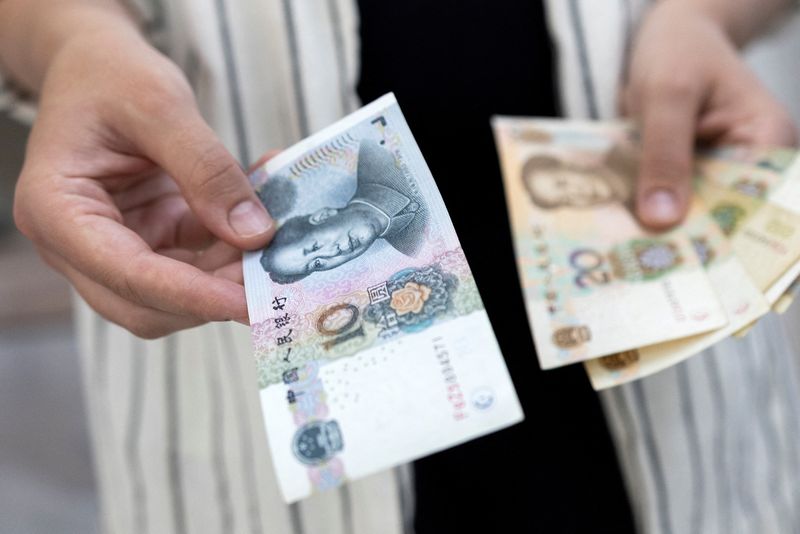By Savyata Mishra
(Reuters) - Investors turned less bearish on the Chinese yuan and the Singaporean dollar as they cut short bets across most Asian currencies, a Reuters poll found, as fears of a banking crisis likely prompted a shift towards a pause in policy tightening by major central banks.
Short bets on the yuan fell to their lowest since December 15, 2022, according to the fortnightly poll, as home sales in China logged much narrower declines - signs that recovery in the embattled property sector and the economy are gathering strength.
The currency firmed on Thursday, following dovish comments from the U.S. Federal Reserve that reined in expectations for more interest rate hikes and lifted sentiment for other Asian currencies.
All the 10 responses were received, however, before the Fed raised its key rate by an expected quarter of a percentage point on Wednesday and pointed to just one more rate hike this year, after a run on Silicon Valley Bank two weeks ago and the crisis in Credit Suisse (SIX:CSGN) wobbled investor confidence in banks.
The dollar index slipped to near seven-week lows following the Fed's latest policy statement that no longer says that "ongoing increases" in rates will likely be appropriate.
Over the weekend, some of the world's largest central banks came together to stop the banking crisis from spreading as Swiss authorities persuaded UBS Group AG (SIX:UBSG) to buy rival Credit Suisse Group AG in a historic deal.
Back in Asia, analysts at Barclays (LON:BARC) said they expect "domestic growth and inflation considerations to drive the monetary policy trajectory for most of EM Asia, despite financial stability issues emanating from the U.S. and Europe".
"Still, if the fallout from the recent events worsens, we think EM central banks may yet again have to re-evaluate their decisions."
Bearish bets on Singapore's dollar eased to their lowest since Nov. 18, 2021. Data on Thursday showed the country's February core inflation rose lower-than-expected.
Short bets on the Indonesian rupiah and the Indian rupee rose slightly from a fortnight ago, while sentiment toward South Korea's won improved.
Last week, Bank Indonesia left interest rates unchanged for a second straight time, while the Philippine central bank raised its key rate by an expected 25 basis points on Thursday.
The Asian currency positioning poll is focused on what analysts and fund managers believe are the current market positions in nine Asian emerging market currencies: the Chinese yuan, South Korean won, Singapore dollar, Indonesian rupiah, Taiwan dollar, Indian rupee, Philippine peso, Malaysian ringgit and the Thai baht.
The poll uses estimates of net long or short positions on a scale of minus 3 to plus 3. A score of plus 3 indicates the market is significantly long U.S. dollars.
The figures include positions held through non-deliverable forwards (NDFs).
The survey findings are provided below (positions in U.S. dollar versus each currency):
DATE USD/CNY USD/KRW USD/SGD USD/ID USD/TWD USD/INR USD/MYR USD/PHP USD/THB
R
23-Mar-23 0.17 0.87 0.16 0.74 0.63 0.58 0.74 0.36 0.37
09-Mar-23 0.68 1.3 0.65 0.56 0.78 0.28 0.78 0.42 0.3
23-Feb-23 0.36 0.77 0.21 0.12 0.30 0.80 0.49 0.33 0.37
09-Feb-23 -0.80 -0.63 -0.72 -0.53 -0.68 0.25 -0.64 -0.40 -1.00
26-Jan-23 -1.29 -1.14 -1.40 -1.15 -0.68 -0.47 -1.25 -0.78 -1.77
12-Jan-23 -1.58 -1.39 -1.31 -0.10 -0.67 0.07 -0.82 -0.61 -1.85
15-Dec-22 0.08 -0.55 -0.85 0.92 -0.22 0.63 -0.36 -0.15 -0.69
1-Dec-22 0.63 -0.15 -0.3 1.08 0.15 0.76 -0.02 0.33 -0.16

17-Nov-22 0.74 0.21 -0.06 1.06 0.84 1.13 1.18 0.89 0.4
03-Nov-22 1.81 1.38 0.47 1.57 1.81 1.47 2.02 1.36 1.34